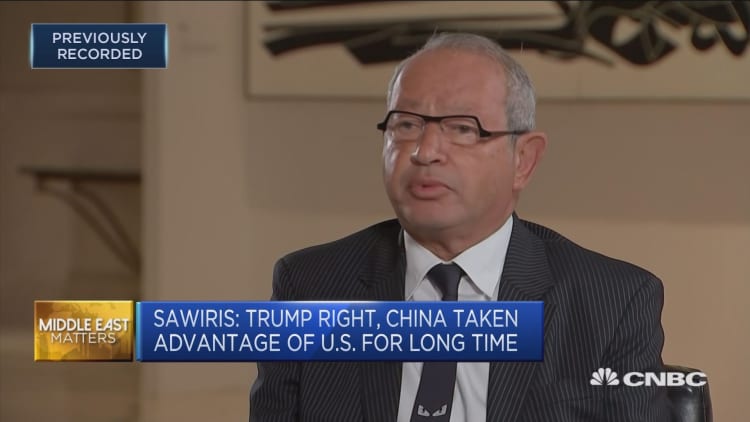International pressure on Saudi Arabia is increasingly being deployed by lawmaking bodies in ways that could slow much-needed foreign investment, regional analysts say.
On Wednesday, the European Commission (EC) added Saudi Arabia to its list of "high-risk third countries" that have "strategic deficiencies" in their anti-money laundering and counter-terrorism financing regimes, also known as AML/CFT.
The designation may not stick; it can be reversed by the European Council or European Parliament in the one-to-two month period that the bodies have to vote on it. But the move highlights a new willingness by lawmakers to more intensely scrutinize Saudi compliance with international conventions and withdraw privileges that the kingdom has enjoyed until now.
As a result of the listing, the EC wrote in a statement, banks and other bodies operating under the EU's anti-money laundering rules "will be required to apply increased checks (due diligence)" on transactions between individuals and institutions from Saudi Arabia, as well as more than 20 other listed countries, "to better identify any suspicious money flows."
The impact of the Commission's decision really depends on its acceptance by other European lawmaking entities as well as that of the U.S. Already France and the U.K. have expressed their opposition, having significant trade ties and weapons exports to the kingdom, and may attempt to reach a middle ground with the EC.
Specific evidence for Saudi Arabia's listing has not been publicly disclosed, but the EC cites risks posed by "third country jurisdictions which have strategic deficiencies in their AML/CFT regimes that pose significant threats to the financial system of the Union."
'Potentially very serious'
Saudi Arabia's inclusion on the list is "potentially very serious," Loretta Napoleoni, terror finance expert and author of the book Terror, Inc., told CNBC via email Thursday. But a rejection from the U.S. of the European decision will prove key. This would create a contradiction, she explained, having an "impact upon European investors and anybody who operates under the EU jurisdiction, but will not affect those who operated under the U.S. and in U.S. dollars."

The kingdom's history with money laundering and terror financing is no secret, Napoleoni added. The designation "is justified because we know that Saudis' money have gone to fund several jihadist organisations for decades. We also have a country whose financial system is not under our jurisdiction."
Islamic finance is a separate system with its own rules — so international monetary authorities lack the power to stop money laundering or terrorist financing, she said. "This is already a huge problem."
A 'strategic priority' for the kingdom
Saudi Arabia's foreign ministry and the Saudi embassy in London did not reply to CNBC's requests for comment. But on Thursday, a government statement from the Saudi Press Agency (SPA) read that Riyadh "notes with regret" the decision, "despite the latter's adoption of measures to reinforce its legal framework, leading to enhanced cooperation with its counterparts."
"The Kingdom reaffirms its commitment to the common fight against money laundering and terrorism financing — a commitment it shares with its international partners and allies," the statement added. The SPA quoted Saudi Finance Minister Mohamed al-Jadaan as saying that fighting the two is a "strategic priority" and that Riyadh would "continue to develop and enhance our regulatory framework to achieve this goal."
The country is "not effectively nor routinely tracking and reporting any suspicious transactions," wrote Eurasia Group's Middle East practice head Ayham Kamel in a note this week. But Riyadh recently established anti money-laundering and anti-terror laws intended to combat terrorism financing, and Kamel notes that a 2018 report from the Financial Action Task Force shows positive compliance by the Saudi government with what's called AML/CFT — anti-money laundering and countering financing of terrorism.
"EU officials have more latitude to penalize Saudi Arabia after the Jamal Khashoggi killing," Kamel said. "In all likelihood, Riyadh has been violating some EU standards with a misplaced confidence that Europe would be unlikely to move against the kingdom."
Saudi Arabia falling out of favor
The development comes as both Republicans and Democrats are pushing different pieces of legislation aimed at holding Riyadh responsible for the killing of Saudi journalist Jamal Khashoggi, withdrawing U.S. support for the Saudi-led offensive in Yemen, and opposing oil cartel OPEC, of which Saudi Arabia is the most powerful member.
Regardless of the outcome, any blemish on the kingdom's image adds further challenges to its economic goals set out in Vision 2030, an ambitious plan spearheaded by Crown Prince Mohammed bin Salman to diversify the economy away from oil and drive private sector job creation. Attracting foreign capital is central to that agenda.
Cinzia Bianco, senior analyst at Gulf State Analytics, says that the language used by the Commission "suggests the move is about encouraging the government, who wants to attract foreign investments, to take proactive steps to become a more palatable destination for European investments."
However, she added, given how European banks are already more cautious than their Asian or American counterparts to engage with Saudi Arabia — where political risk is considered very high at the moment — "this move can actually impact negatively on the issue even if remains only partially adopted."


